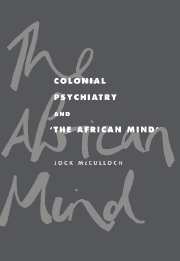Book contents
- Frontmatter
- Contents
- Acknowledgements
- 1 Introduction
- 2 Psychiatry and colonial practice
- 3 Some contemporary reviews of colonial mental health systems
- 4 Towards a theory of the African mind
- 5 Theory into practice: Carothers and the politics of Mau Mau
- 6 African intelligence, sexuality and psyche
- 7 The African family and the colonial personality
- 8 The elements of orthodoxy
- 9 From psychiatry to politics
- 10 Conclusion
- Notes
- Bibliography
- Index
4 - Towards a theory of the African mind
Published online by Cambridge University Press: 04 December 2009
- Frontmatter
- Contents
- Acknowledgements
- 1 Introduction
- 2 Psychiatry and colonial practice
- 3 Some contemporary reviews of colonial mental health systems
- 4 Towards a theory of the African mind
- 5 Theory into practice: Carothers and the politics of Mau Mau
- 6 African intelligence, sexuality and psyche
- 7 The African family and the colonial personality
- 8 The elements of orthodoxy
- 9 From psychiatry to politics
- 10 Conclusion
- Notes
- Bibliography
- Index
Summary
To European science the most primitive of all peoples were to be found in Australasia and Africa, and it was the inhabitants of those regions who excited the greatest interest. Theories about the mind of the African were abstract; their inventors had no direct contact with the peoples about whom they wrote. Indeed, the theories preceded by several decades the introduction of Western psychiatry to colonial areas. Through historical accident the first literature about mental illness among people of African descent was published in the United States. It was only much later that a parallel literature, written from within the continent, was produced about the indigenous African.
Once mental health services were established in Africa, a scholarly literature dealing with the African soon began to emerge. Like the asylums themselves the literature was most elaborate where settler populations were largest, and so Kenya and Algeria were fertile sites for ethnopsychiatric research. The most prolific and long the most cited of these ethnopsychiatrists was J. C. Carothers. When Carothers arrived in Kenya in 1929, he was introduced to psychological medicine by H. L. Gordon, one of the most senior physicians in the colony and the author of numerous papers presented to the Kenyan branch of the British Medical Association in Nairobi.
In 1934, in the prestigious Journal of Mental Science, Gordon gave an account of European psychiatry as practised in Kenya and offered a number of observations about the mentality and culture of the African.
- Type
- Chapter
- Information
- Colonial Psychiatry and the African Mind , pp. 46 - 63Publisher: Cambridge University PressPrint publication year: 1995



